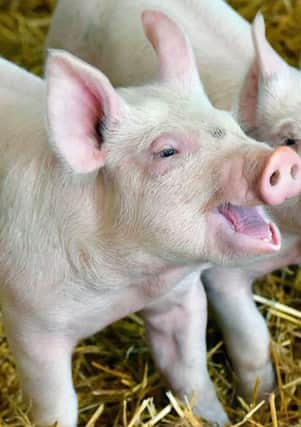GM pigs could help battle world swine disease


The team at the University of Edinburgh used advanced genetic techniques to produce pigs which can potentially withstand porcine reproductive and respiratory syndrome(PRRS) which is endemic in most pig producing countries world-wide.
Vaccines have mostly failed to stop the spread of the virus which is evolving rapidly and is one of the greatest challenges facing pig producers today. In Europe alone, the disease is estimated to cost the pig industry more than €1.5 billion (£1.27bn) each year.
Advertisement
Hide AdAdvertisement
Hide AdThe infection causes severe breathing problems in young pigs and breeding failures in pregnant females.
Early tests have revealed cells from the pigs are completely resistant to infection with both major subtypes of the virus causing the disease.
The animals are otherwise healthy and the change – introduced using gene-editing technology – should not affect their ability to fight off other infections, the researchers say.
Studies have shown that the PRRS virus targets immune cells called macrophages. A molecule on the surface of these cells called CD163 plays a key role in enabling the PRRS virus to establish an infection.
The research team at the university’s Roslin Institute, in collaboration with animal genetics company Genus, used a gene-editing tool called CRISPR/Cas9 to cut out a small section of the CD163 gene in the pigs’ DNA code.
Laboratory tests of cells from the pigs with the modified CD163 gene have confirmed this change in the pig’s DNA blocks the virus from being able to cause infection.
The next stage in the study, published in the journal Plos Pathogens, will be to test whether the pigs are resistant to infection when exposed to the virus.
The institute’s lead researcher Professor Alan Archibald, said: “Genome-editing offers opportunities to boost food security by reducing waste and losses from infectious diseases, as well as improving animal welfare by reducing the burden of disease.”
Advertisement
Hide AdAdvertisement
Hide AdJonathan Lightner, chief scientific officer for Genus, said: “ Genus is committed to pioneering the responsible application of technology to animal genetic improvement to enhance the well-being of animals, the livelihoods of farmers, and the sustainable approach to producing food for a growing global population.”
Scientists from The Pirbright Institute also contributed to the research.